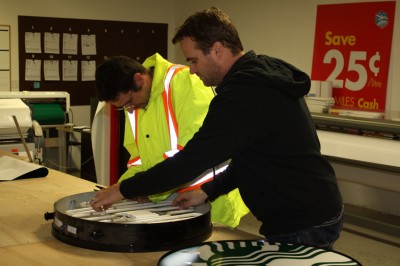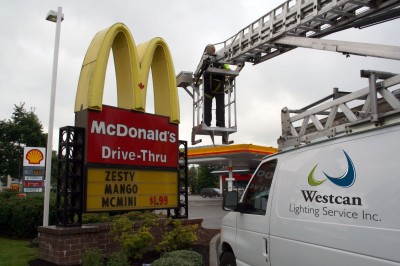Offering an advantage
Eggink used to live in British Columbia, too, until another sign company he was working for transferred him to Calgary in 2009. He joined Westcan as a technician before taking on greater responsibilities in terms of client service.
“I wanted to be a ‘ground guy’ visiting customers,” he explains. “Over the course of a typical day, I go to the office to work on new accounts, check in with our managers, visit our customers and take photos of signs that need to be repaired and send those to the clients.”
Thomasen explains the photography tactic has been key to the company’s success, helping it stand out in the marketplace.
“From the start, our technicians went on night drives, when you can see if there’s damage or any other problems with an illuminated sign,” he says. “They’d check out our roster of chains, like Future Shop, Starbucks, CIBC and Shell, take photos and send them direct to our contacts to get approval for new work orders. When out outage happens, there’s nothing better than a photo taken at night!”
The company has also followed in the footsteps of Chris’s Sign Service by specializing in energy-efficient retrofits of illuminated signs, replacing older neon or fluorescent systems with light-emitting diodes (LEDs).
“We work with LED suppliers to promote this service,” says Thomasen. “The advantage for Chris’s Sign Service is the customers get rebates from BC Hydro, but the savings are actually more significant in Alberta, because electricity is more expensive there.”
In many cases, an initial pilot program or sample site is used to sell clients on a wider rollout.
“Shell has become our top client with lots of LED retrofits,” says Eggink.
Diversifying services
Westcan’s clients reflect Alberta’s economic strengths. In addition to petrochemical brands like Shell, they include food-service chains like McDonald’s, Wendy’s, Tim Hortons, A&W and Starbucks.
“We’ve converted a good number of Starbucks store signs to LEDs and reduced their servicing needs,” says Thomasen. “Of course, this means we’re cutting into our own business, so we have to expand into other areas.”
Over time, the company’s workload has incorporated more sign installation and fabrication alongside the servicing and maintenance jobs. This has involved hiring additional staff, but also using current technicians’ related experience.
“A lot of us are former sign installers,” Eggink explains. “We’re doing more installs now in both Calgary and Edmonton.”
This has helped position Westcan as a one-stop resource, so when its existing servicing and maintenance customers need a new sign installed, they know where to call.
“We also have other sign companies as our clients, where they need us to provide work they don’t handle themselves, like lighting,” says Eggink. “Everybody knows everybody in the sign industry. That’s also why we do some sign manufacturing, such as when another sign company can’t get a vinyl order out. We just do small things, though. We’ve never built a pylon sign ourselves.”
“We specialize in being on the ground,” says Thomasen.
Going national
While Westcan’s path in Alberta has certainly echoed that of Chris’s Sign Service in British Columbia—and the two companies continue to work together—its sights are set on eventually becoming a national brand.
“There are lots of similarities across our partnership with Chris, but we do have some different accounts now and Westcan is getting its own legs,” says Thomasen. “We keep hiring, chasing the growth. You can only grow so fast, but we need to bring in extra people just to keep our current customers happy!”
The company already does some work in Saskatchewan and has a Winnipeg-based partner serving Manitoba.
“We’re not in Ontario yet, as we don’t want to lose too much focus when we’re still expanding in Alberta, but we are going farther east,” says Thomasen. “We want to focus on growth without letting it get away from us, so our intention is to have our own people in all of the cities we serve. If you subcontract, you lose control.”







